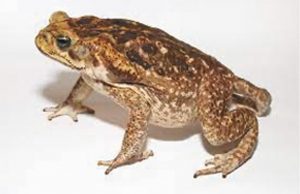 A species of warty, toxic toads invades Florida backyards every year as it multiplies across the southern part of the state. When you see heavy rains, be on the lookout for the Cane Toad. The cane toad, also known as the bufo toad, is a poisonous amphibian that, when provoked, can produce a milky white toxin on its back, a substance that is particularly dangerous to house pets.
A species of warty, toxic toads invades Florida backyards every year as it multiplies across the southern part of the state. When you see heavy rains, be on the lookout for the Cane Toad. The cane toad, also known as the bufo toad, is a poisonous amphibian that, when provoked, can produce a milky white toxin on its back, a substance that is particularly dangerous to house pets.
The toxin could leave a dog or cat in serious distress or dead in as little as 15 minutes, according to the Florida Fish and Wildlife Commission. The creatures breed after periods of rainy weather, according to Toad Busters, a south Florida company specializing in the removal of the dangerous toads. The rainy season lasts through the summer.
The state’s wildlife commission encourages homeowners to kill Cane Toads whenever possible. The white toxin is visible near the sacs on the left side of the toad. What do they look like? Honestly, cane toads are gross. They’re tan to reddish-brown, dark brown or gray, and their backs are marked with dark spots, according to the University of Florida. They have warty skin. Cane toads have large, triangular parotoid glands on their shoulders that secrete a milky toxin. (Native toads’ parotoid glands are oval.) Unlike native southern toads, cane toads do not have ridges or “crests” on top of the head.
Even cane toad tadpoles are toxic. You can spot a cane toad by its size and its triangular glands. Cane toads usually are 4-6 inches long, sometimes growing to 9½ inches. With very few exceptions, any toad in Florida that is larger than 4 inches is not native and almost certainly is an invasive cane toad, according to the University of Florida. A cane toad’s favorite place is the ground. They don’t like to climb.
Cane toads are native to South and Central America and were introduced into Palm Beach County to control pests in sugar cane fields, according to the University of Florida. They can be found in central and south Florida and in an isolated population along the Florida Panhandle. They live in urbanized habitats and agricultural lands but also in some natural areas, including floodplain and mangrove swamps. The cane toad (Bufo marinus) can hurt or kill pets.
Cane toads prey on anything they can get into their mouths, according to the University of Florida, but they normally feed on beetles, centipedes, crabs, millipedes, roaches, scorpions, spiders and other invertebrates. They also have been known to eat frogs, snakes, small reptiles, small birds and small mammals.
If a pet bites, licks or even sniffs a cane toad, it could become sick and, if not treated, it could die. Symptoms of poisoning in pets include excessive drooling and extremely red gums, headshaking, crying, loss of coordination and sometimes convulsions. If a dog bites or encounters a cane toad, use a damp cloth or towel and wipe the inside of the dog’s mouth to make sure no toxins were swallowed. Do not flush the dog’s mouth with a hose. It could send toxins down the animal’s throat.
Dogs should be taken to a veterinarian as soon as possible to treat symptoms such as seizures, heart problems such as arrhythmia and body temperatures that skyrocket, then plunge. Dog droppings should be picked up; cane toads are attracted to proteins in the droppings.
There is a humane way to get rid of cane toads. The University of Florida recommends euthanizing them by rubbing or spraying 20% benzocaine toothache gel or sunburn spray (not 5% lidocaine) on the toad. In a few minutes, it will become unconscious. Put the toad in a sealed plastic bag in the freezer for 24-48 hours to ensure it is humanely euthanized.
The best trapping method is a net and a deep bucket with steep sides, according to the University of Florida. Make sure to put a board or lid on top of the bucket. The Florida wildlife commission recommends wearing latex, rubber, or nitrile gloves to safely handle the toads.
Contact Animal Oasis Veterinary Hospital to schedule a wellness exam, vaccinations, and calming medications for your pets today!
Animal Oasis Veterinary Hospital in Naples offers the most up to date and progressive veterinary services for your pets. Ranging from laser surgery, ultrasound, dental X-rays, radiology, full pharmacy, and in house diagnostics, Animal Oasis Veterinary Hospital provides your pets with the necessary options for treatment.
Animal Oasis Veterinary Hospital
239-431-7980
www.aovethospital.com









